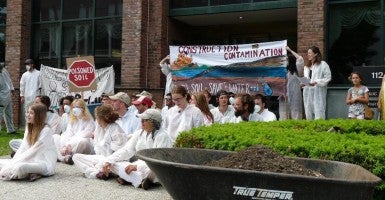An energy project that reduces greenhouse gas emissions and slashes heating costs might sound like an environmental activist’s dream.
But one renewable-energy group is standing in the way of just such a project in Vermont—literally.
Rising Tide Vermont, a group dedicated to “dismantling systems of oppression and domination such as sexism, racism and colonialism,” seeks to kill the Addison and Rutland County natural gas pipeline, an infrastructure project that would cut Vermonters’ heating costs by 50 percent and shrink their carbon footprint by 25 percent.
In recent weeks, the group’s members have resorted to trespassing, chaining people to buildings and even an alleged assault at one of Vermont’s public utility companies.
Vermont Gas, which delivers clean-burning natural gas to more than 40,000 customers, plans to extend its 750-mile distribution network about 93 miles to bring low-cost home-heating energy to 16,000 more Vermonters.
“When we look at the realities of natural gas infrastructure, there is no project in Vermont that brings the benefits as this project,” said Stephen Wark, communications director at Vermont Gas.
According to Wark, the first phase of the project will reduce Vermont’s greenhouse gas production by 300,000 tons and save customers $200 million in energy costs. If all three phases of the project are completed, those numbers jump to 2 million tons of greenhouse gas reductions and $750 million in energy savings for Vermonters.
These potential CO2 reductions didn’t stop protesters from gathering this week to oppose the project.
Standing outside the state Public Service Board office in Montpelier, Rising Tide members in hazmat outfits sang odes to “solidarity” and held signs that read “Stop the Vermont Gas Pipeline” and “Construction Equals Contamination.” A dirt-filled wheelbarrow stationed nearby was marked “poisoned soil.”
“We’re demanding that the Department of Public Service suspend the Certificate of Public Good for Vermont Gas’s fracked-gas pipeline,” a protester said. “The fracked-gas pipeline, from Alberta where the gas is being extracted to the pipeline construction here, is poisoning people’s soil and water and ruining their livelihoods.”
Wark said the protesters are misinformed.
“We respect and welcome the concerns that people voice, however, we want the conversation to be based in fact. There’s a lot of hysteria and demagoguery going on about hydraulic fracturing,” Wark said. “The first thing folks don’t realize is that gasoline, propane and oil all come from a hydraulically fractured process. If you look in Vermont, the majority of home heating is fuel oil, and that fuel oil comes from one of two sources: It’s hydraulically fractured or it’s tar sands.”
Wark said his company has a stellar record of safety in delivering natural gas in the state and one of the lowest numbers of reported leaks in the region.
Unlike many distributors, Vermont Gas has no bare steel or cast iron pipe in the ground. In addition, company engineers monitor the system 24 hours a day with the help of a robot that traverses the line to scan for incongruities and deficiencies.
According to the Environmental Protection Agency’s clean energy website, natural gas produces half as much carbon dioxide and a third less nitrogen oxide relative to coal-fired generation.
Wark said groups such as Rising Tide fear clean-burning natural gas makes it hard for renewable energy sources to compete.
“Very good friends of mine in the renewable-energy sector and in the environmental sector say cheap gas is bad for renewables,” Wark said. “So that’s part of what we’re dealing with. They see it as a competitive threat. Renewables are not yet on grid parity with natural gas. And so opponents are in an all-or-nothing mode right now.”




























